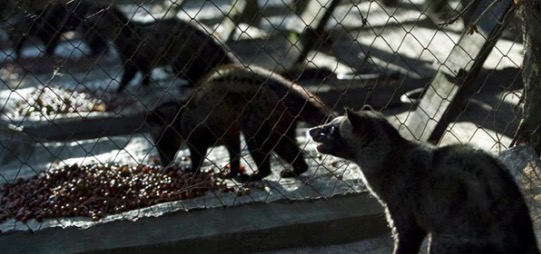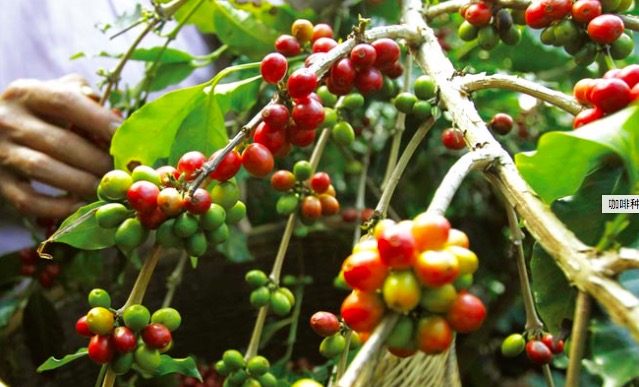Expose Kopi Luwak industry chain: civets are abused, mostly get sick and die.
Core tip: wild civets use coffee beans as part of a balanced diet, while captive civets are overfed with immature coffee beans and locked up in claustrophobic sunshine spaces.
Us media reported on July 26 that the world's most expensive cup of coffee can sell for $100, but there is a hidden price for producing the coffee: the well-being of a cat that lives in the jungles of Southeast Asia.
The US quartz financial website published a report entitled "the world's most expensive coffee is a nightmare for the animals that produce this coffee" on July 24, saying that even in the world of boutique coffee and nitrogen-cooled coffee, Kopi Luwak (also known as "civet coffee") is also the benchmark for luxury coffee. The coffee is made from partially digested coffee beans excreted by coconut cats (a civet endemic to Southeast Asia). It has a stronger flavor and a lighter sour taste. Although the price of Kopi Luwak has fallen since 2013, it is still as high as $200 to $400 a kilogram (1300-2700 yuan) and is increasingly popular with tourists.
Kopi Luwak has traditionally been made from coconut cat droppings collected in the wild, the report said. But its high prices have led to wild civets being captured and kept in captivity on coffee plantations. A recent report published in the journal Animal Protection assessed the survival of 48 civets on 16 plantations. The Kopi Luwak industry is "a slave industry", the report said.
Neil de Cruz, a wildlife researcher and co-author of the report at the nonprofit World Society for the Conservation of Animals, said: "Unfortunately, many tourists turn a blind eye to the cruelty of captive civets making Kopi Luwak." they even lined up to take pictures of civets and share them on social networks. "
Wild civets eat coffee beans as part of a balanced diet, while captive civets are overfed with immature coffee beans. Wild civets usually like to be nocturnal, while captive civets are kept in sunlight spaces that can easily lead to claustrophobia. When they are enraged, they fight. Many captive civets get sick or die from stress.
Reported that since 2013, including the British department store Harold and Selfridge department stores, at least 13 retailers have taken Kopi Luwak off the shelves or promised to investigate the production process of Kopi Luwak. But regulating the Kopi Luwak industry is not easy: animal rights activists say it is difficult to trace the source of Kopi Luwak, and even harder to determine whether they are involved in the abuse of civets.

Important Notice :
前街咖啡 FrontStreet Coffee has moved to new addredd:
FrontStreet Coffee Address: 315,Donghua East Road,GuangZhou
Tel:020 38364473
- Prev

In order to win the top coffee market in Europe, the United States and Japan, Ugandan coffee is not good enough to go to prison.
Uganda does not hesitate to put illegal farmers in jail in order to improve the quality of coffee beans, but experts believe that this can only be achieved by introducing farming programs, education and other incentives. ■ Farming projects, education and other incentives should be used to boost coffee quality rather than arrests. Coffee beans are an important export from Uganda.
- Next

Yunnan Enterprises to build Asia's largest Coffee Base in Laos
Zhang Yue, deputy general manager of Chongqing Neng Investment Group, said that Chongqing Neng Tou, a key state-owned enterprise in Chongqing, has formulated a coffee development strategy to promote enterprise transformation and upgrading, and its Chongqing Coffee Trading Center was officially listed on June 17, 2016. With the support of the governments of China and Laos, the company will cooperate with Yunnan Changshengda to jointly invest in building the largest original coffee base and industrial park in Asia.
Related
- The ceremony is full! Starbucks starts to cut the ribbon at a complimentary coffee station?!
- A whole Michelin meal?! Lucky launches the new "Small Butter Apple Crispy Latte"
- Three tips for adjusting espresso on rainy days! Quickly find the right water temperature, powder, and grinding ratio for espresso!
- How much hot water does it take to brew hanging ear coffee? How does it taste best? Can hot water from the water dispenser be used to make ear drip coffee?
- What grade does Jamaica Blue Mountain No. 1 coffee belong to and how to drink it better? What is the highest grade of Blue Mountain coffee for coffee aristocrats?
- What are the flavor characteristics of the world-famous coffee Blue Mountain No. 1 Golden Mantelin? What are the characteristics of deep-roasted bitter coffee?
- Can I make coffee a second time in an Italian hand-brewed mocha pot? Why can't coffee be brewed several times like tea leaves?
- Hand-brewed coffee flows with a knife and a tornado. How to brew it? What is the proportion of grinding water and water temperature divided into?
- What is the difference between Indonesian Sumatra Mantinin coffee and gold Mantinin? How to distinguish between real and fake golden Mantelin coffee?
- What does bypass mean in coffee? Why can hand-brewed coffee and water make it better?

